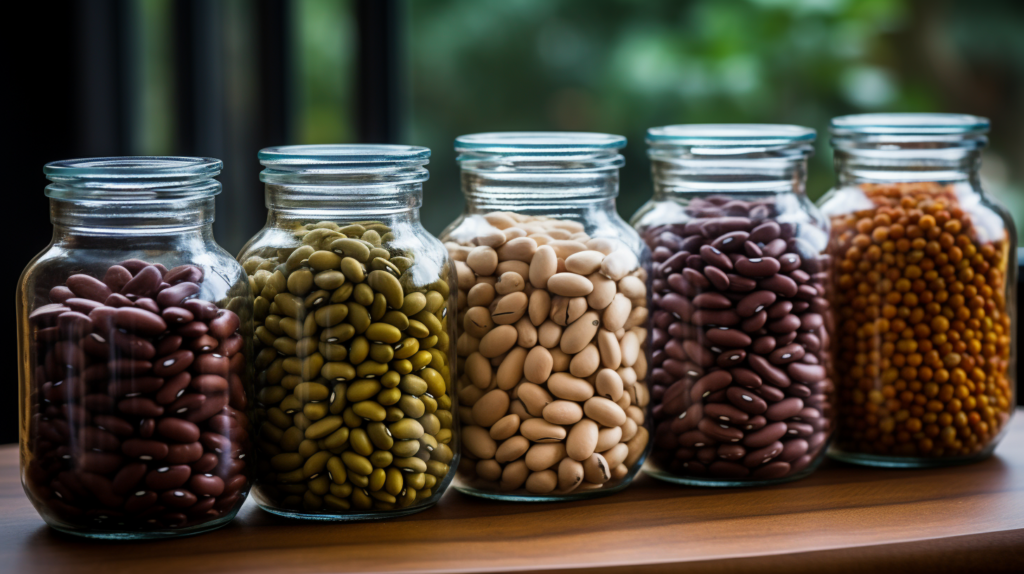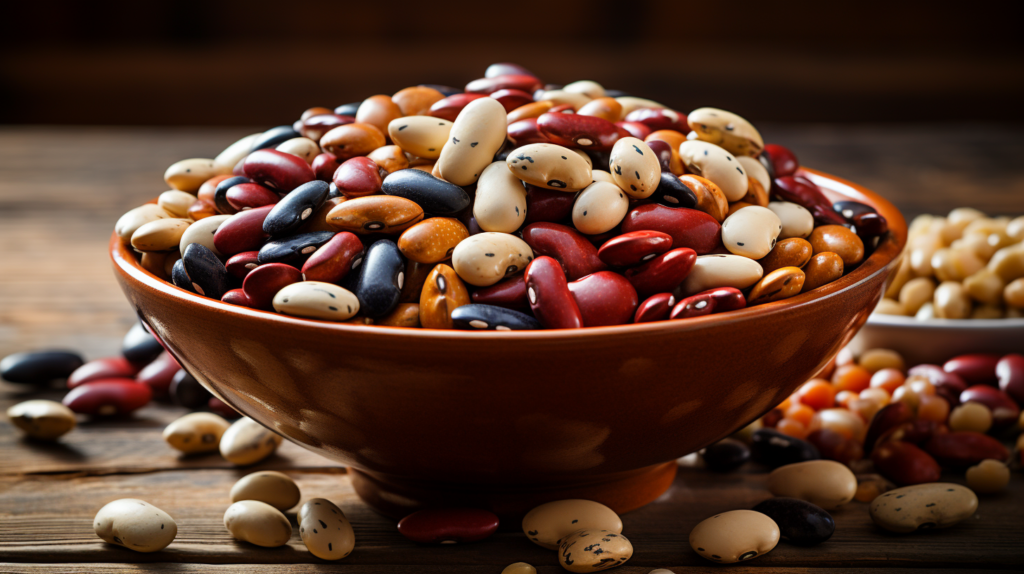If you’re looking to promote optimal digestive health and ensure regular bowel movements, incorporating daily portions of legumes into your diet may be the solution you’ve been searching for. Legumes are a family of plants that include beans, lentils, peas, and chickpeas, and they are packed with fiber, protein, vitamins, and minerals that are essential for maintaining overall health and well-being.
In this article, we will delve into the benefits of legumes for bowel regularity and how they can promote healthy digestion. We will explore the fiber content of legumes, the types of fiber they contain, and their impact on beneficial gut bacteria. Additionally, we’ll provide tips for incorporating legumes into your diet and highlight potential side effects and precautions you should be aware of before adding them to your meals.
Key Takeaways:
- Legumes are a family of plants that include beans, lentils, peas, and chickpeas.
- Adding daily portions of legumes to your diet can promote digestive health and ensure consistent bowel movements.
- The high fiber content in legumes adds bulk to the stool and helps prevent constipation.
- Legumes contain both soluble and insoluble fiber, which are essential for promoting healthy digestion.
- Legumes support the growth of beneficial gut bacteria, which aid in digestion and contribute to bowel regularity.

The Importance of Bowel Regularity
Before delving into the impact of legumes on bowel regularity, it’s important to understand why maintaining regular bowel movements is essential for digestive health. Regular bowel movements help eliminate waste and toxins from your body, prevent constipation, and promote overall well-being.
When you don’t have regular bowel movements, stool can become hard and difficult to pass, leading to constipation. This can cause discomfort, bloating, and abdominal pain. Long-term constipation can even lead to more severe digestive issues.
On the other hand, having regular bowel movements can help keep your digestive system healthy and functioning properly. It helps you maintain a healthy weight, reduces your risk of colon cancer, and can even improve your mood and energy levels.
Lifestyle Factors for Bowel Regularity
In addition to consuming legumes, maintaining a healthy lifestyle can support bowel regularity. Drinking plenty of water, exercising regularly, managing stress levels, and incorporating other fiber-rich foods into your diet can all contribute to a healthy digestive system and promote regular bowel movements.
- Drink at least 8 glasses of water per day
- Exercise for at least 30 minutes per day
- Eat a variety of fruits, vegetables, and whole grains
- Avoid processed foods and excessive amounts of sugar and fat
- Limit your alcohol and caffeine intake
By adopting these healthy habits, you can support your digestive health and ensure regular bowel movements.
The Role of Legumes in a Healthy Diet
Legumes are a highly nutritious food group that can provide numerous health benefits when incorporated into your diet. These versatile plant-based foods are high in protein, fiber, vitamins, and minerals, making them an excellent choice for supporting overall health and well-being.
Legumes, also known as pulses, include a variety of beans, lentils, and peas. They are a staple in many cuisines around the world and can be easily incorporated into your meals in a variety of ways.
One of the key benefits of legumes is their high fiber content. Fiber plays a crucial role in maintaining bowel regularity and promoting digestive health. Legumes are an excellent source of both soluble and insoluble fiber, which work together to support healthy digestion.
| Type of Fiber | Benefits | Sources |
|---|---|---|
| Soluble Fiber | Forms a gel-like substance in the intestines, aiding in digestion | Lentils, peas, chickpeas |
| Insoluble Fiber | Adds bulk to stool, promoting regular bowel movements | Beans, lentils, peas |
In addition to their fiber content, legumes are also rich in beneficial nutrients such as iron, potassium, and folate. These nutrients play a vital role in supporting overall health and wellness.
Incorporating legumes into your diet is easy and delicious. You can add them to soups, stews, salads, and even use them as a meat substitute in dishes like veggie burgers or tacos. Legume-based spreads like hummus are also a tasty option.
When adding legumes to your diet, it’s important to start with small portions and gradually increase your intake to allow your body to adjust. Some people may experience bloating or digestive discomfort when first introducing legumes, but these symptoms typically subside over time.
Overall, legumes are a highly nutritious food group that can support a healthy diet and promote digestive health. Consider incorporating them into your meals to reap the many benefits they offer.

The Fiber Content of Legumes
Legumes are a rich source of dietary fiber, which plays an essential role in bowel regularity and digestive health. A 100-gram serving of cooked chickpeas contains 7.6 grams of fiber, while cooked lentils have 7.9 grams per 100 grams. Similarly, 100 grams of cooked black beans provide 8.7 grams of fiber, and cooked split peas have 7.6 grams.
The high fiber content in legumes adds bulk to the stool, making it easier to move through the digestive system. This helps prevent constipation and promotes regular bowel movements – a crucial aspect of digestive health. A diet that is low in fiber can lead to digestive problems such as constipation, bloating, and abdominal discomfort.
| Legume Type | Fiber Content (per 100 grams) |
|---|---|
| Chickpeas (cooked) | 7.6 grams |
| Lentils (cooked) | 7.9 grams |
| Black beans (cooked) | 8.7 grams |
| Split peas (cooked) | 7.6 grams |
The Importance of Fiber for Bowel Regularity
Fiber is a type of complex carbohydrate that cannot be digested by your body, which means it passes through your digestive system mostly intact. There are two types of fiber: insoluble and soluble.
Insoluble fiber adds bulk to the stool and helps it move through the digestive tract. In contrast, soluble fiber absorbs water and forms a gel-like substance in the intestines, which aids in digestion and promotes bowel regularity. Both types of fiber are essential for maintaining optimal digestive health.
Consuming legumes, which are rich in both types of fiber, can help ensure consistent bowel movements and prevent digestive problems like constipation. Adding legumes to your diet is an easy and effective way to increase your fiber intake and promote optimal digestive health.
Types of Fiber in Legumes
Legumes are a rich source of dietary fiber, which plays a crucial role in maintaining overall digestive health. There are two types of fiber that are found in legumes:
- Soluble Fiber: This type of fiber dissolves in water and forms a gel-like substance in the intestines, which helps to slow down digestion. Soluble fiber is found in lentils, chickpeas, and peas and can help regulate blood sugar levels and lower cholesterol.
- Insoluble Fiber: This type of fiber does not dissolve in water and adds bulk to the stool, making it easier to pass through the digestive tract. Insoluble fiber is found in beans and can help prevent constipation and promote regular bowel movements.
Both types of fiber are essential for maintaining healthy digestion and bowel regularity. Consuming a variety of legumes that contain both soluble and insoluble fiber can help support optimal digestive health.
Legumes and Beneficial Gut Bacteria
Consuming legumes regularly can contribute to optimal digestion by supporting the growth of beneficial gut bacteria. These bacteria play a crucial role in breaking down food and producing short-chain fatty acids, which help nourish the cells lining the colon and promote healthy digestion.
“Legumes are a rich source of dietary fiber, which is the primary food source for the beneficial bacteria in our gut. By consuming legumes regularly, we can help ensure the growth and survival of these important microorganisms.”
Studies have shown that individuals who consume legumes regularly have a greater abundance of beneficial gut bacteria compared to those who do not include legumes in their diet. This is because legumes contain prebiotics, which are complex carbohydrates that the body cannot digest but provide a food source for the beneficial gut bacteria to thrive on.
In addition to promoting optimal digestion, consuming legumes and supporting beneficial gut bacteria has been linked to a range of health benefits, including reduced inflammation and improved immune function.
The Benefits of Beneficial Gut Bacteria
The beneficial gut bacteria that thrive in the presence of legumes are responsible for a range of functions in the body, including:
- Breaking down and fermenting dietary fiber
- Producing short-chain fatty acids
- Enhancing nutrient absorption
- Regulating metabolism
- Supporting immune function
By consuming legumes and supporting the growth of beneficial gut bacteria, you can help ensure that these important functions are carried out effectively and contribute to overall health and well-being.

The Role of Legumes in Preventing Constipation
Constipation can be a frustrating and uncomfortable condition that affects many people. If you’re looking for a natural way to alleviate constipation and promote regular bowel movements, incorporating legumes into your diet may be an effective solution.
Legumes are an excellent source of dietary fiber, which can help add bulk to the stool and promote healthy bowel movements. By retaining water in the stool, legumes can also make it softer and easier to pass, reducing the discomfort associated with constipation.
| Type of Legume | Fiber Content (per 100g serving) |
|---|---|
| Black Beans | 16g |
| Lentils | 8g |
| Chickpeas | 7g |
| Split Peas | 8g |
| Kidney Beans | 10g |
In addition to their fiber content, legumes also contain nutrients that can support digestive health. The beneficial gut bacteria that legumes promote can aid in breaking down food and producing short-chain fatty acids which nourish the cells lining the colon.
If you’re new to incorporating legumes into your diet, it’s important to start with small portions and gradually increase your intake. This can help avoid any digestive discomfort such as bloating or gas that may occur when first introducing legumes.
Overall, consuming legumes regularly can help alleviate constipation and promote regular bowel movements. Adding legumes to your diet in the form of soups, stews, salads, and spreads can be an enjoyable and delicious way to support digestive health and improve overall well-being.
Additional Nutritional Benefits of Legumes
In addition to promoting bowel regularity, legumes offer a wide range of other nutritional benefits that can contribute to overall health and wellness. Here are some of the key nutritional benefits of incorporating legumes into your diet:
| Nutrient | Amount per 1/2 cup cooked legumes |
|---|---|
| Protein | 6-8 grams |
| Fiber | 6-8 grams |
| Folate | 40-90% of daily recommended intake (DRI) |
| Iron | 10-20% of DRI |
| Potassium | 4-10% of DRI |
Legumes are also low in fat and cholesterol, making them a heart-healthy choice. The high protein content in legumes makes them an excellent meat substitute for vegetarians and vegans.
Additionally, legumes are rich in antioxidants, which can help protect the body from oxidative stress and inflammation. Antioxidants are thought to play a role in preventing chronic diseases such as cancer, diabetes, and heart disease.
Overall, incorporating legumes into your diet can provide a range of nutritional benefits that support your overall health and well-being. Whether you’re looking to improve your digestion, maintain a healthy weight, or reduce your risk of chronic disease, legumes are a nutritious and delicious addition to any meal.

How to Incorporate Legumes Into Your Diet
If you want to experience the benefits of legumes for bowel regularity and digestive health, incorporating them into your diet is easy and delicious.
Try adding cooked legumes to your favorite soups, stews, and salads. You can also use them as a meat substitute in dishes like veggie burgers or tacos. Legume-based spreads like hummus are another tasty option.
Here are some additional tips for incorporating legumes into your diet:
- Replace meat with legumes in your favorite recipes, such as chili or spaghetti sauce.
- Use lentils to boost the protein and fiber content of your salads.
- Snack on roasted chickpeas for a healthy and satisfying snack.
- Add canned or cooked beans to your breakfast scramble or omelet.
Experiment with different recipes and find what works best for you. With so many different types of legumes, the possibilities for healthy and delicious meals are endless.
Potential Side Effects and Precautions
While incorporating legumes into your diet can have numerous benefits for bowel regularity and digestive health, it’s important to be aware of potential side effects and take necessary precautions.
Legume Side Effects
Some individuals may experience bloating, gas, or digestive discomfort when first introducing legumes into their diet. This is because legumes contain oligosaccharides, a type of carbohydrate that can be difficult for some people to digest. However, this side effect is usually temporary and can be reduced by gradually increasing your intake of legumes and drinking plenty of water.
Legume Precautions
If you have any existing digestive conditions or allergies, it’s important to consult with a healthcare professional before incorporating legumes into your diet. Legumes may exacerbate certain conditions, such as irritable bowel syndrome or inflammatory bowel disease. Additionally, individuals with a legume allergy should avoid consuming legumes and legume-based products.

Other Lifestyle Factors for Bowel Regularity
While incorporating legumes into your diet can help promote bowel regularity and digestive health, there are other lifestyle factors to consider as well. By adopting healthy habits, you can support your body’s natural processes and maintain regular bowel movements.
- Stay hydrated: Drinking plenty of water is crucial for maintaining bowel regularity. Aim for at least eight glasses of water per day to ensure that your stool stays soft and easy to pass.
- Exercise regularly: Regular physical activity can help stimulate the muscles in your intestines, promoting bowel regularity. Aim for at least 30 minutes of moderate exercise per day.
- Manage stress levels: Stress can disrupt digestive function and lead to irregular bowel movements. Try relaxation techniques such as deep breathing, meditation, or yoga to help manage stress levels.
- Incorporate other fiber-rich foods: In addition to legumes, there are many other fiber-rich foods that can help support bowel regularity. These include whole grains, fruits, vegetables, and nuts.
By adopting these healthy habits, you can support your digestive system and promote regular bowel movements. Remember to start incorporating legumes into your diet gradually, and consult with a healthcare professional if you have any concerns or existing digestive issues.
Seeking Professional Advice
If you experience persistent digestive issues or have concerns about bowel regularity, seeking professional advice is always recommended. Your healthcare provider can offer personalized advice based on your specific needs and help you create a diet and lifestyle plan to support optimal digestion and bowel regularity.
If you are considering incorporating legumes into your diet but have existing digestive conditions or allergies, it’s especially important to consult with a healthcare professional. They can assess any potential risks and help you determine if legumes are a suitable addition to your diet.
Note: It’s important to keep in mind that while legumes can support bowel regularity and promote digestive health, they should not be relied upon as a sole solution for chronic digestive issues. If you experience persistent symptoms, seek medical advice.

Research and Studies on Legumes for Bowel Regularity
There have been numerous research studies exploring the positive impact of legumes on bowel regularity and digestive health. These studies show that incorporating legumes into your diet can increase fiber intake and promote regular bowel movements.
A study published in The Journal of Nutrition found that consuming a diet high in legumes significantly improved bowel function in participants compared to a diet with low legume intake. The study concluded that legume consumption is an effective dietary strategy for maintaining bowel regularity.
Another study published in the European Journal of Clinical Nutrition found that consuming legumes daily increased stool frequency and improved overall digestive health in participants. The study also noted that legumes can help prevent constipation, a common issue that can contribute to discomfort and negatively impact digestive health.
Comparative Table for Research and Studies on Legumes for Bowel Regularity
| Study | Findings |
|---|---|
| The Journal of Nutrition | A diet high in legumes significantly improved bowel function in participants compared to a diet with low legume intake. |
| European Journal of Clinical Nutrition | Consuming legumes daily increased stool frequency and improved overall digestive health in participants. Legumes can help prevent constipation. |
These studies emphasize the importance of incorporating legumes into your diet for optimal digestive health. Consuming legumes regularly can increase fiber intake, promote regular bowel movements, and prevent constipation.
Delicious Legume Recipes for Bowel Regularity
Looking for tasty and healthy ways to incorporate more legumes into your diet? Look no further! Here are some delicious legume recipes that not only taste great but also promote bowel regularity.
Lentil Soup
This hearty soup is full of fiber and protein, making it an excellent choice for promoting bowel regularity. Here’s what you’ll need:
| Ingredients: | Instructions: |
|---|---|
| 1 cup dried lentils | Soak lentils in water for at least 2 hours. Drain and rinse. |
| 1 onion, chopped | Sauté onion in olive oil until translucent. |
| 2 carrots, chopped | Add chopped carrots and continue to sauté for 5 minutes. |
| 2 celery stalks, chopped | Add chopped celery and continue to sauté for an additional 5 minutes. |
| 3 cloves garlic, minced | Add minced garlic and sauté for 1-2 minutes. |
| 6 cups vegetable broth | Add vegetable broth and bring to a boil. |
| 1 bay leaf | Add bay leaf and lentils to the pot. Reduce heat and simmer for 30-40 minutes, until lentils are tender. |
| Salt and pepper to taste | Season with salt and pepper to taste. |
Enjoy this soup warm for a comforting and satisfying meal.
Chickpea Salad
This flavorful salad is packed with fiber and nutrients, making it an excellent choice for promoting bowel regularity. Here’s what you’ll need:
| Ingredients: | Instructions: |
|---|---|
| 1 can chickpeas, drained and rinsed | Combine chickpeas, red onion, cucumber, tomato, and feta cheese in a bowl. |
| 1/2 red onion, chopped | |
| 1/2 cucumber, chopped | |
| 1 tomato, chopped | |
| 1/4 cup crumbled feta cheese | |
| 2 tbsp olive oil | In a separate bowl, whisk together olive oil, lemon juice, garlic, and Dijon mustard to make the dressing. |
| 1 tbsp lemon juice | |
| 1 clove garlic, minced | |
| 1 tsp Dijon mustard | |
| Salt and pepper to taste | Toss the salad with the dressing, then season with salt and pepper to taste. |
This salad is perfect for a light and refreshing lunch or dinner.
Black Bean Tacos
These delicious tacos are a great way to incorporate black beans into your diet. Here’s what you’ll need:
| Ingredients: | Instructions: |
|---|---|
| 1 can black beans, drained and rinsed | Mash black beans with a fork or potato masher, then season with chili powder and cumin. |
| 1 tsp chili powder | |
| 1 tsp ground cumin | |
| 8 corn tortillas | Warm tortillas in a dry skillet over medium-high heat for about 30 seconds on each side. |
| 1 avocado, sliced | Top each tortilla with mashed black beans, avocado slices, lettuce, and salsa. |
| 1 cup shredded lettuce | |
| 1/2 cup salsa |
These tacos are a satisfying and flavorful way to enjoy the benefits of legumes.
Try incorporating these tasty legume recipes into your diet to promote bowel regularity and support your digestive health!

Conclusion
By now, you should understand the benefits of legumes for bowel regularity and digestive health. Incorporating daily portions of legumes into your diet can promote regular bowel movements, prevent constipation, and support the growth of beneficial gut bacteria.
Remember, legumes are a versatile and nutritious food that can be added to a variety of dishes. Whether you prefer lentils, beans, peas, or chickpeas, there are plenty of options to choose from.
In addition to their impact on bowel regularity, legumes offer a range of other nutritional benefits. They are low in fat and cholesterol, high in protein, and rich in vitamins and minerals such as folate, iron, and potassium.
Final Thoughts
If you’re looking to improve your digestive health and promote regular bowel movements, incorporating legumes into your diet is a great place to start. Remember to start with small portions and gradually increase your intake, and consult with a healthcare professional if you have any concerns or existing digestive conditions.
At the end of the day, prioritizing your digestive health through a balanced diet, exercise, and other healthy lifestyle habits can have a significant impact on your overall well-being. So, go ahead and add some legumes to your next meal and boost your digestive health!
Thank you for reading our article about the benefits of legumes for bowel regularity and digestive health. We hope this information was helpful and informative.
FAQ
How do daily portions of legumes affect bowel health and digestive regularity?
Daily portions of legumes can promote digestive health and ensure consistent bowel movements. Incorporating legumes into your diet adds fiber, which adds bulk to the stool, making it easier to pass through the digestive system. Legumes also support the growth of beneficial gut bacteria, which aid in digestion and contribute to bowel regularity.
Why is bowel regularity important?
Maintaining regular bowel movements is essential for digestive health. Regular bowel movements help eliminate waste and toxins from the body, prevent constipation, and promote overall well-being.
What are legumes?
Legumes are a family of plants that include beans, lentils, peas, and chickpeas. They are nutritious foods packed with fiber, protein, vitamins, and minerals.
How does the fiber content in legumes impact bowel regularity?
The high fiber content in legumes adds bulk to the stool, making it easier to pass through the digestive system. This helps prevent constipation and promotes regular bowel movements.
What types of fiber do legumes contain?
Legumes contain both soluble and insoluble fiber. Soluble fiber absorbs water, forming a gel-like substance in the intestines that aids in digestion. Insoluble fiber adds bulk to the stool and helps it move through the digestive tract. Both types of fiber are important for promoting healthy digestion and bowel regularity.
How do legumes support beneficial gut bacteria?
Legumes support the growth of beneficial gut bacteria, which help break down food and produce short-chain fatty acids. These fatty acids nourish the cells lining the colon and support healthy digestion.
Can legumes help prevent constipation?
Yes, legumes can help prevent constipation. The high fiber content in legumes adds bulk to the stool and helps retain water, making it softer and easier to pass.
What are the additional nutritional benefits of legumes?
In addition to their impact on bowel regularity, legumes are low in fat and cholesterol, high in protein, and rich in vitamins and minerals such as folate, iron, and potassium. Incorporating legumes into your diet can contribute to overall health and well-being.
How can I incorporate legumes into my diet?
There are numerous ways to include legumes in your daily meals. You can add cooked legumes to soups, stews, salads, or use them as a meat substitute in dishes like veggie burgers or tacos. Legume-based spreads like hummus are also a tasty option. Experiment with different recipes and find what works best for you.
Are there any potential side effects or precautions when consuming legumes?
While legumes are generally safe to consume, some individuals may experience bloating, gas, or digestive discomfort when first introducing them into their diet. Start with small portions and gradually increase your intake to allow your body to adjust. If you have any existing digestive conditions or allergies, consult with a healthcare professional before incorporating legumes into your diet.
What lifestyle factors can support bowel regularity?
In addition to consuming legumes, maintaining a healthy lifestyle can support bowel regularity. This includes drinking plenty of water, exercising regularly, managing stress levels, and incorporating other fiber-rich foods into your diet.
Should I seek professional advice regarding legume consumption and bowel regularity?
If you have persistent digestive issues or concerns about bowel regularity, it’s always a good idea to consult with a healthcare professional. They can provide personalized advice based on your specific needs and help you create a diet and lifestyle plan to support optimal digestion and bowel regularity.
Are there any research studies on the relationship between legumes and bowel regularity?
Yes, there have been numerous studies exploring the impact of legume consumption on bowel regularity. These studies consistently show that incorporating legumes into your diet can have a positive effect on digestive health and promote regular bowel movements.
Do you have any delicious legume recipes for promoting bowel regularity?
Yes! We have curated a selection of delicious legume recipes that not only promote bowel regularity but also satisfy your taste buds. From hearty bean soups to flavorful lentil salads, there’s something for everyone.
In conclusion, what are the benefits of incorporating legumes into your diet?
In conclusion, incorporating legumes into your daily diet can have a positive impact on bowel regularity and digestive health. The high fiber content, support for beneficial gut bacteria, and nutritional benefits of legumes make them a valuable addition to a well-rounded diet. By including legumes in your meals, you can promote optimal digestion and ensure consistent bowel movements.














